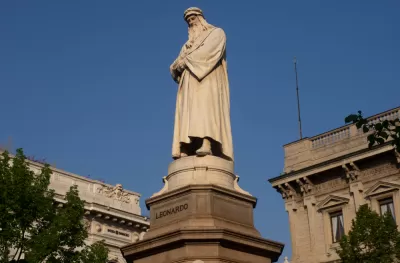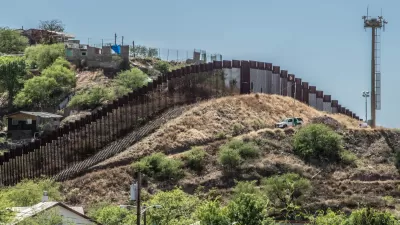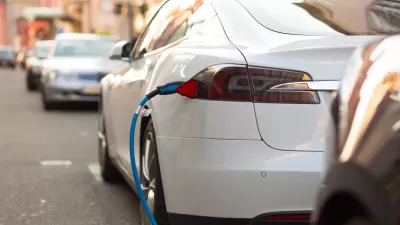Introduced on April 30, the $2 trillion conceptual plan is likely to be dismissed by Congressional Republicans wary of increasing taxes and adding to the deficit, according to an extensive article by The Hill published three days later.

When Senate Minority Leader Charles Schumer (D-N.Y) and House Speaker Nancy Pelosi (D-Calif.) emerged from a White House meeting on April 30, they announced that they had reached an agreement with President Trump to proceed with a $2 trillion infrastructure plan. Conspicuously absent were any Republicans, not even members of the administration who had participated in the meeting, which should have been a clue to the challenges that await such an ambitious proposal.
"The next date to watch as this infrastructure plan develops is three weeks from now, when the trio will meet again, and President Trump is 'expected to tell them how he planned to actually pay for the ambitious project,'" wrote Planetizen editor James Brasuell on April 30.
Whatever shape the payment plan takes, it will have to pass the GOP-controlled Senate, but according to Hill reporters Alexander Bolton, Juliegrace Brufke, and Scott Wong, that is unlikely to happen for the same reasons that Trump's own plan met resistance from Congressional Republican leaders.
Federal gas tax and Highway Trust Fund reauthorization
"GOP lawmakers say the president’s grand proposal for a $2 trillion deal is too ambitious and warn that they will oppose any measure that adds to the deficit," they write.
Many Republicans also say they are against raising taxes to pay for an infrastructure initiative, a stance that would make it extremely difficult to find money to finance a package even half the size of Trump’s desired amount.
“I think $2 trillion is really ambitious. If you do a 35-cent increase in the gas tax, for example, indexed for inflation, it gets you only half a trillion [dollars],” said Senate Republican Whip John Thune (S.D.), the No. 2 Senate GOP leader.
Unlike most of the 10 other Republican congress members quoted in the article, at least Thune did not rule out increasing the gas tax. The president is on record as supporting hiking the federal gas tax, stuck at 18.4 cents per gallon since 1993, by a quarter per gallon.
“The other problem that’s going to come up is we’re bumping up against highway reauthorization,” said Sen. John Boozman (R-Ark.). “That’s going to take a lot of dollars. The Highway Trust Fund is depleted … it’s going to be very difficult to fund that.”
Boozman raises a good point. Congress passed the current five-year reauthorization, known as the Fixing America’s Surface Transportation (FAST) Act, in December 2015, so it expires in on Dec. 31, 2020. Keeping the Highway Trust Fund solvent should provide better bipartisan motivation for hiking the fuel tax. In the meantime, it will be interesting to see how Speaker Pelosi champions the infrastructure plan, should one emerge with the White House, though the House.
Related in Planetizen:
- Democrats Make Peace With Trump for the Sake of a $2 Trillion Infrastructure Plan, April 30, 2019
-
Trump's Infrastructure Plan Looks Dead on Arrival, February 28, 2018
-
Transportation Reauthorization Now a Done Deal, December 3, 2015,
FULL STORY: Trump's pursuit of infrastructure deal hits GOP roadblock

Maui's Vacation Rental Debate Turns Ugly
Verbal attacks, misinformation campaigns and fistfights plague a high-stakes debate to convert thousands of vacation rentals into long-term housing.

Planetizen Federal Action Tracker
A weekly monitor of how Trump’s orders and actions are impacting planners and planning in America.

In Urban Planning, AI Prompting Could be the New Design Thinking
Creativity has long been key to great urban design. What if we see AI as our new creative partner?

King County Supportive Housing Program Offers Hope for Unhoused Residents
The county is taking a ‘Housing First’ approach that prioritizes getting people into housing, then offering wraparound supportive services.

Researchers Use AI to Get Clearer Picture of US Housing
Analysts are using artificial intelligence to supercharge their research by allowing them to comb through data faster. Though these AI tools can be error prone, they save time and housing researchers are optimistic about the future.

Making Shared Micromobility More Inclusive
Cities and shared mobility system operators can do more to include people with disabilities in planning and operations, per a new report.
Urban Design for Planners 1: Software Tools
This six-course series explores essential urban design concepts using open source software and equips planners with the tools they need to participate fully in the urban design process.
Planning for Universal Design
Learn the tools for implementing Universal Design in planning regulations.
planning NEXT
Appalachian Highlands Housing Partners
Mpact (founded as Rail~Volution)
City of Camden Redevelopment Agency
City of Astoria
City of Portland
City of Laramie





























